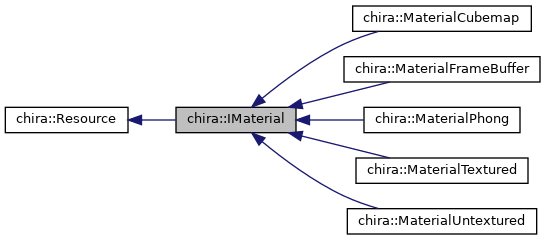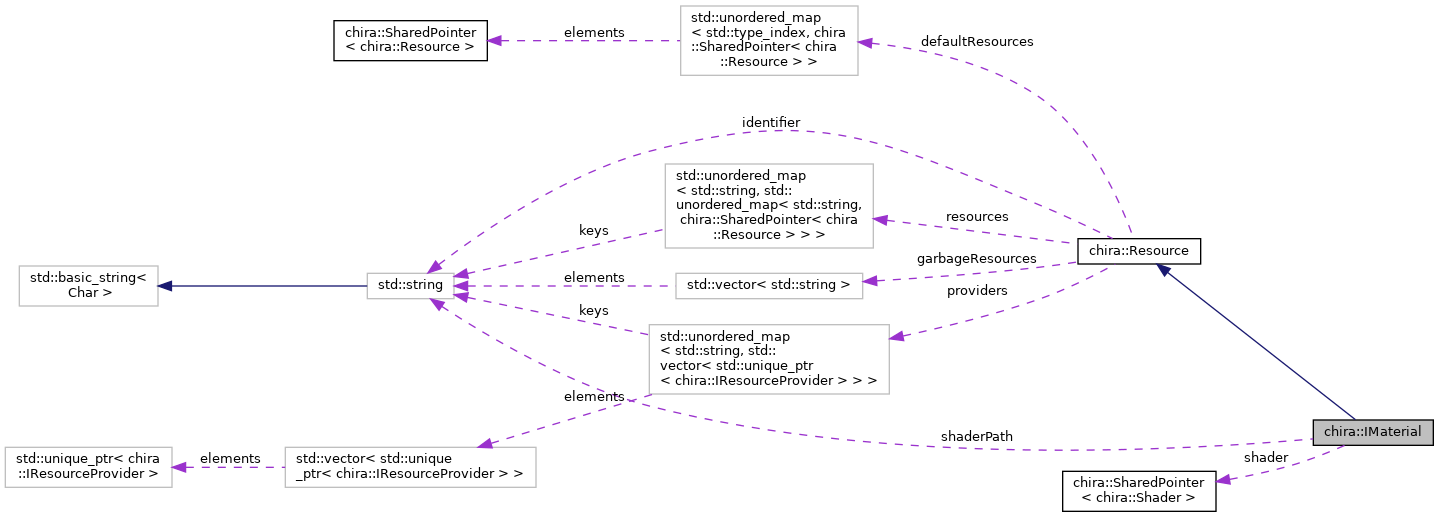 |
Chira Engine
A customizable MIT-licensed game engine.
|
 |
Chira Engine
A customizable MIT-licensed game engine.
|


Public Member Functions | |
| IMaterial (std::string identifier_) | |
| void | compile (const byte buffer[], std::size_t bufferLength) override |
| virtual void | use () const |
| SharedPointer< Shader > | getShader () const |
| template<typename Archive > | |
| void | serialize (Archive &ar) |
 Public Member Functions inherited from chira::Resource Public Member Functions inherited from chira::Resource | |
| Resource (std::string identifier_) | |
| std::string_view | getIdentifier () const |
Protected Attributes | |
| SharedPointer< Shader > | shader |
| std::string | shaderPath {"file://shaders/unlitTextured.json"} |
 Protected Attributes inherited from chira::Resource Protected Attributes inherited from chira::Resource | |
| std::string | identifier |
Additional Inherited Members | |
 Static Public Member Functions inherited from chira::Resource Static Public Member Functions inherited from chira::Resource | |
| static void | addResourceProvider (IResourceProvider *provider) |
| static IResourceProvider * | getLatestResourceProvider (const std::string &provider) |
| static IResourceProvider * | getResourceProviderWithResource (const std::string &identifier) |
| template<typename ResourceType , typename... Params> | |
| static SharedPointer< ResourceType > | getResource (const std::string &identifier, Params... params) |
| template<typename ResourceType , typename... Params> | |
| static void | precacheResource (const std::string &identifier, Params... params) |
| template<typename ResourceType > | |
| static SharedPointer< ResourceType > | getCachedResource (const std::string &identifier) |
| template<typename ResourceType , typename... Params> | |
| static SharedPointer< ResourceType > | getUniqueResource (const std::string &identifier, Params... params) |
| template<typename ResourceType , typename... Params> | |
| static SharedPointer< ResourceType > | getUniqueUncachedResource (const std::string &identifier, Params... params) |
| You might want to use this sparingly as it defeats the entire point of a cached, shared resource system. | |
| template<typename ResourceType , typename... Params> | |
| static std::unique_ptr< ResourceType > | getUniqueUncachedPropertyResource (const std::string &identifier, const nlohmann::json &props, Params... params) |
| The only way to make a PropertiesResource without a provider is to make it unique, and not to cache it. More... | |
| static std::pair< std::string, std::string > | splitResourceIdentifier (const std::string &identifier) |
| static const std::vector< std::unique_ptr< IResourceProvider > > & | getResourceProviders (const std::string &providerName) |
| static bool | hasResource (const std::string &identifier) |
| static void | removeResource (const std::string &identifier) |
| If resource is present in the cache and has a reference count less than or equal to 2, mark it for removal. | |
| static void | cleanup () |
| Delete all resources marked for removal. | |
| static void | discardAll () |
| Deletes ALL resources and providers. Should only ever be called once, when the program closes. | |
| template<typename ResourceType > | |
| static bool | registerDefaultResource (const std::string &identifier) |
| template<typename ResourceType > | |
| static bool | hasDefaultResource () |
| template<typename ResourceType > | |
| static SharedPointer< ResourceType > | getDefaultResource () |
| static void | createDefaultResources () |
 Static Protected Member Functions inherited from chira::Resource Static Protected Member Functions inherited from chira::Resource | |
| static auto | getDefaultResourceConstructors () -> std::unordered_map< std::type_index, std::function< void()>> & |
| static void | logResourceError (const std::string &identifier, const std::string &resourceName) |
| We do a few predeclaration workarounds. | |
 Static Protected Attributes inherited from chira::Resource Static Protected Attributes inherited from chira::Resource | |
| static std::unordered_map< std::string, std::vector< std::unique_ptr< IResourceProvider > > > | providers |
| static std::unordered_map< std::string, std::unordered_map< std::string, SharedPointer< Resource > > > | resources |
| static std::unordered_map< std::type_index, SharedPointer< Resource > > | defaultResources |
| static std::vector< std::string > | garbageResources |
Definition at line 12 of file MaterialFactory.h.